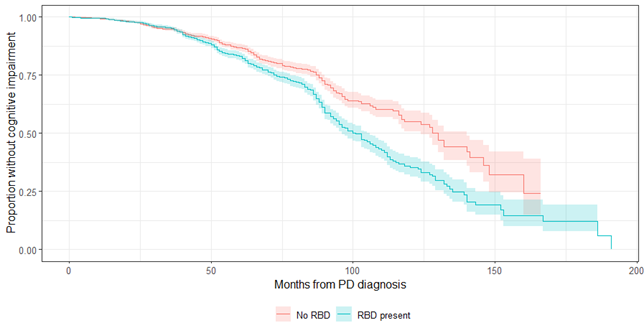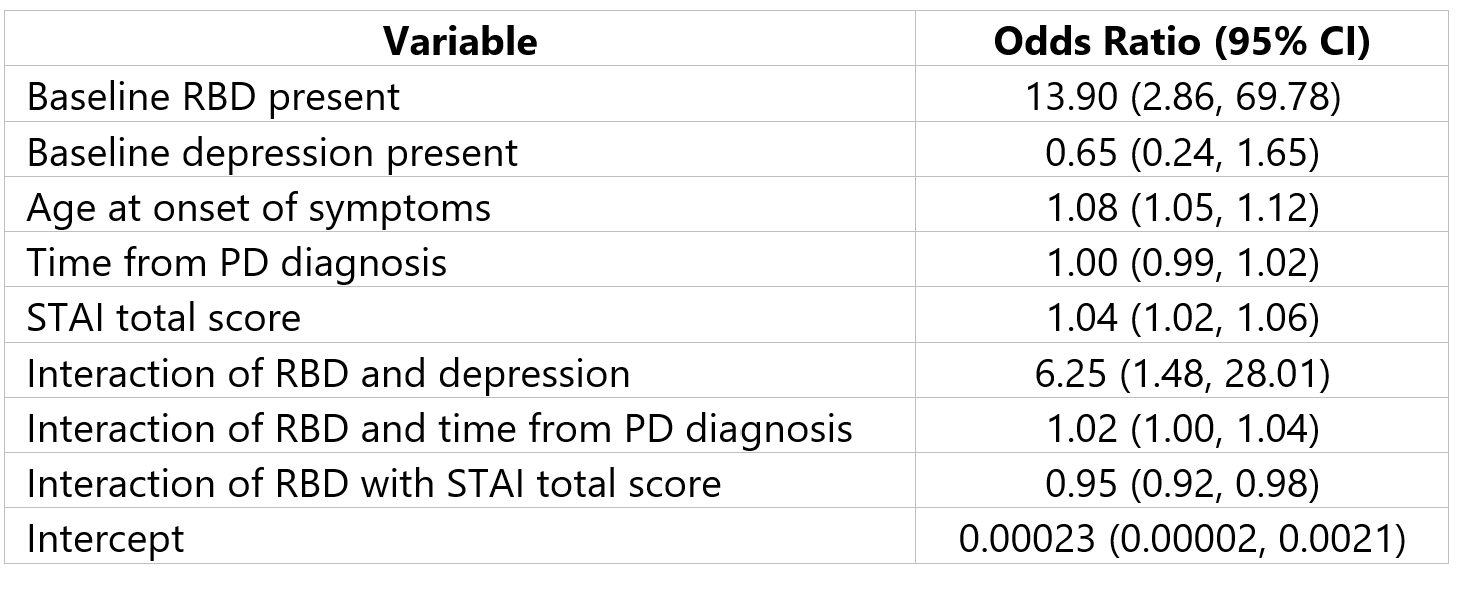Category: Parkinson's Disease: Non-Motor Symptoms
Objective: To identify the impact of prodromal RBD in the incidence of cognitive impairment in patients with early PD.
Background: The association between sleep disorders and cognitive impairment is well-established [1], as well as the specific connection between sleep disorders and neurodegenerative dementia [2]. Given the lack of efficacious interventions for cognitive impairment in PD, preventive strategies are crucial for reducing the cognitive burden in this high-risk population. In this study, we investigate the role of RBD as a predictor of cognitive impairment in PD.
Method: We used data from the Parkinson’s Progression Markers Initiative (PPMI, www.ppmi-info.org) study to examine PD patients who were enrolled within 2 years of motor symptom onset. We defined cognitive impairment as a transition from normal cognition to MCI or from MCI to dementia at any time point. We classified RBD status based on a cut-off score of five or higher on the RBD Screening Questionnaire answered at the time of the initial study visit. Then, we conducted a survival analysis and a log rank test stratified by baseline RBD to compare the rates of cognitive impairment. Following this, we fitted a logistic regression model with cognitive impairment as the outcome variable, selecting the optimal model by utilizing the Akaike information criterion (AIC). We checked for multicollinearity using a variance inflation factor (VIF) threshold of 10. We used the area under a receiver operating characteristic curve (AUROC) as our primary performance metric for our classification task.
Results: The survival analysis included 1361 patients (see [Figure 1] for Kaplan-Meier curves). The log-rank test indicated a significant difference between the survival curves of the two groups (p<0.001). We evaluated 5150 regression models and selected the one with the minimum AIC. The best model estimated an odds ratio of 13.9 for RBD as a predictor of cognitive impairment (see [Table 1] for the model variables and coefficients). The VIF values for each variable were below five. Our model had an AUROC of 0.6.
Conclusion: Cognitive impairment is more prevalent among patients with prodromal RBD. This may be attributed to impaired sleep quality, affective disorders that often co-occur with RBD, or intrinsic biological factors. This finding underscores the need for early cognitive assessment and lifestyle interventions that mitigate cognitive decline in this population.
Kaplan-Meier curve by baseline RBD.
Logistic regression model coefficients.
References: [1] Casagrande M, Forte G, Favieri F, Corbo I. Sleep Quality and Aging: A Systematic Review on Healthy Older People, Mild Cognitive Impairment and Alzheimer’s Disease. Int J Environ Res Public Health. 2022 Jul 11;19(14):8457. doi: 10.3390/ijerph19148457. PMID: 35886309; PMCID: PMC9325170.
[2] Brzecka A, Leszek J, Ashraf GM, Ejma M, Ávila-Rodriguez MF, Yarla NS, Tarasov VV, Chubarev VN, Samsonova AN, Barreto GE, Aliev G. Sleep Disorders Associated With Alzheimer’s Disease: A Perspective. Front Neurosci. 2018 May 31;12:330.
To cite this abstract in AMA style:
A. Martinez-Nunez, H. Hutchinson, V. Lavu, Q. Yuan, J. Dwarampudi, J. Wong. Prodromal RBD and the risk of cognitive impairment in Parkinson’s disease. [abstract]. Mov Disord. 2024; 39 (suppl 1). https://www.mdsabstracts.org/abstract/prodromal-rbd-and-the-risk-of-cognitive-impairment-in-parkinsons-disease/. Accessed December 31, 2025.« Back to 2024 International Congress
MDS Abstracts - https://www.mdsabstracts.org/abstract/prodromal-rbd-and-the-risk-of-cognitive-impairment-in-parkinsons-disease/


